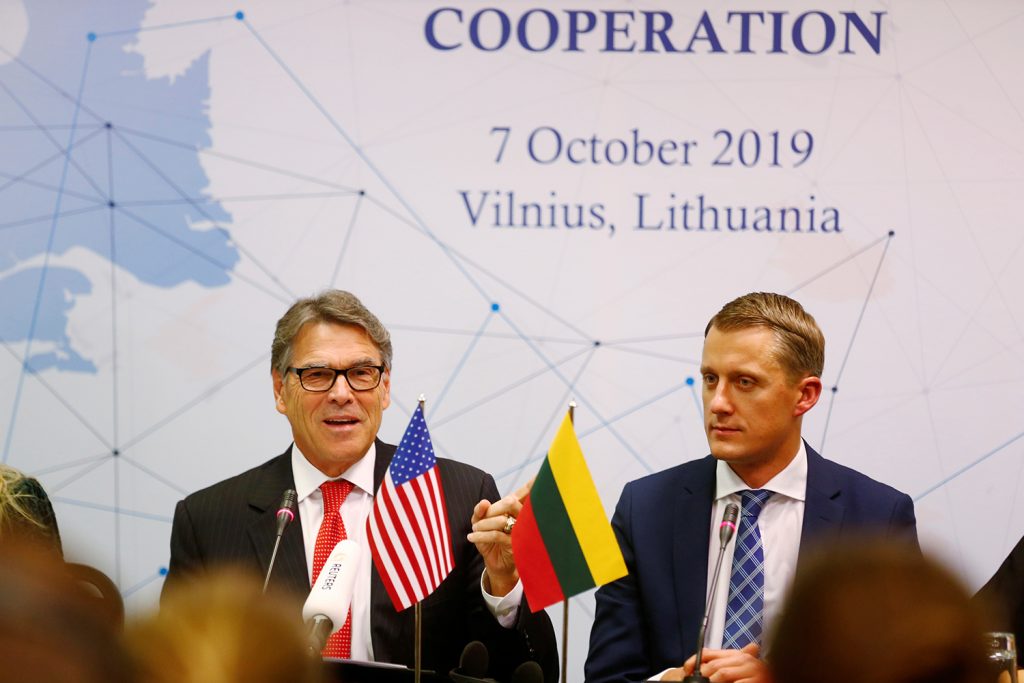
U.S. Secretary of Energy Rick Perry and Lithuanian Minister of Energy Zygimantas Vaiciunas attend a news conference after the partnership for Transatlantic energy cooperation conference in Vilnius, Lithuania October 7, 2019. REUTERS/Ints Kalnins
The
Partnership for Transatlantic Energy Cooperation (P-TEC) advanced from
framework to call to action at the second ministerial, in Vilnius, Lithuania, on
October 6-7. US Secretary of Energy Rick Perry rolled out P-TEC in 2018 at the Three Seas Initiative Forum
and Business Summit in Romania, and hosted the inaugural P-TEC
Ministerial on the sidelines of CERAWeek in March
2019 in Houston. P-TEC and the Atlantic Council have a shared objective to
enhance secure and resilient energy systems across Europe, and the Atlantic
Council has been engaged in the initiative from the very beginning.
P-TEC
aims to bring the transatlantic community together to build secure and
resilient energy systems. Policy makers and private sector stakeholders within
the transatlantic community can cooperate across the areas of energy
transmission systems analysis, sharing best practices on cyber security,
promoting new capital investment in key energy infrastructures, and renewable
energy deployment.
Transatlantic
cooperation on optimizing energy security is at the core of the Atlantic
Council’s work, as energy security translates into economic and national
security. For that reason, the Atlantic Council has been a champion of the
P-TEC initiative. Ambassador Richard Morningstar moderated an energy security panel
at the first P-TEC Ministerial, on the
sidelines of CERAWeek.
In
addition, the P-TEC initiative complements regional efforts such as the Three
Seas Initiative (3SI). Ian Brzezinski, senior fellow
at the Atlantic Council, and one of the “founding fathers” of the 3SI, notes
“P-TEC and the Three Seas Initiative are overlapping efforts with potential to
significantly enhance energy security and resilience of Central Europe. Both
feature an important transatlantic dimension that can expand and deepen the
linkages between the economies of the United States and Central Europe.”
3SI
was born out of the Atlantic Council’s “North
South Corridor” project in 2014 and was led by General James Jones,
co-chaired by Pawel Olechnowicz, and directed by Ian Brzezinski and David
Koranyi. 3SI aims at stimulating more rapid development of the region
stretching between the Baltic, Black, and Adriatic Seas across the transport,
energy, and digital sectors. As Estonia surges ahead in planning to host the
2020 3SI Summit and Business Forum, a Baltic location for the second P-TEC
Ministerial was a fitting choice. P-TEC also cooperates with the European Commission
in Brussels: Ditte Juul Jørgensen, the new Director-General for Energy was also
one of the keynote speakers at the second ministerial.
The
second ministerial hosted by the US Department of Energy and the Republic of
Lithuania was a significant step towards turning discussions into tangible solutions.
Secretary Perry
announced two vehicles to do so: the four ministerial working
groups and the new initiative, E-TEAM.
Secretary Perry kicked off the second Ministerial on October 6 during dinner remarks: “Following our inaugural meeting in March in Houston, this week we will continue to focus on the partnership of twenty-three Central and Eastern European nations and the United States including the partnership’s practical implementation in the Baltic region, while strengthening energy cooperation between the United States and Baltic States. P-TEC will ensure positive outcomes for the Baltic States and other regional partners as well as result in improved transatlantic business opportunities.”
E-TEAM
Europe Technical Expert Advisory Mission (E-TEAM) is designed to draw upon the expertise of Argonne National Laboratory and provide technical assistance to partners and allies under the framework of P-TEC. These experts can be dispatched upon request to conduct assessments of vulnerabilities in energy systems using existing models and tools deployed in the United States. The goal is to provide a snapshot for policy makers to make informed decisions about how to prioritize the protection of critical infrastructure.
Ministerial working groups
The
newly-announced working groups cover key energy sector areas: critical infrastructure,
security of energy supply, energy efficiency and renewable energy, and civil nuclear
energy. The four ministerial panels at the recent P-TEC meetings reflected those
issues.
Ambassador
Richard Morningstar, founding chairman of the
Atlantic Council Global Energy Center, who moderated a panel on critical infrastructure
at the second ministerial notes that “P-TEC is significant because Central and
Eastern Europe (CEE) energy security is a bipartisan issue and is a good
example where parties can work together. CEE countries are some of our
strongest allies.”
Global Energy Center Senior Fellow Ambassador Andras Simonyi facilitated a discussion on security of energy supply. Simonyi remarked that “P-TEC is a truly forward-looking project to engage the United States in CEE, which will enhance the transatlantic relationship in general and will benefit both: CEE and the United States.”
Next steps
The
working groups will create action plans based on their objectives. In the
instance of the critical infrastructure working group, the action plan could
include work on cybersecurity best practices, threat assessment, resilience
enhancement, technical assistance on energy networks integration, and ways the
United States could catalyze investment within those areas in CEE
Having advanced rather quickly, for a multinational initiative, P-TEC has tremendous potential to deepen transatlantic cooperation on pressing issues across the energy sector, especially in coordination with existing initiatives such as 3SI.
Olga Khakova is associate director for European
energy security at the Atlantic Council’s Global Energy Center.
The second ministerial hosted by the US Department of Energy and the Republic of Lithuania was a significant step towards turning discussions into tangible solutions.
|